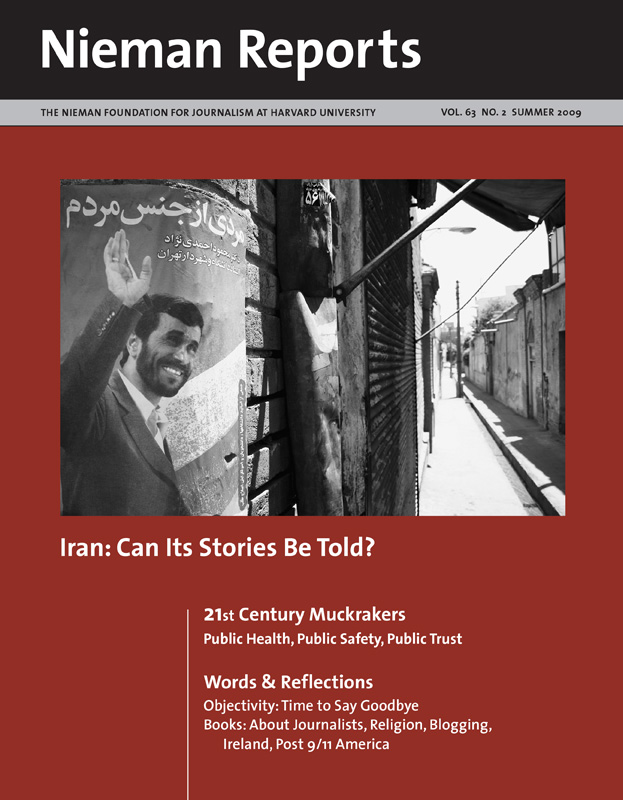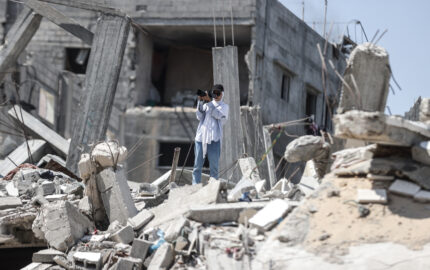In March, Martha Raddatz, who is ABC News senior foreign affairs correspondent, wrote a Reporter’s Notebook entry describing what happened to her and her colleagues on a reporting trip to Iran. She wrote about this in the wake of Iran’s arrest and jailing of American freelance reporter Roxana Saberi on charges of “gathering news illegally.” In April, Saberi was charged with spying. Raddatz’s words appeared on the ABC News Web site, and excerpts are reprinted here with permission of ABC News.
I have direct experience with the Iranian government’s attitudes about “gathering news illegally.” Last September, while on a trip to Tehran with my producer, Ely Brown, and my cameraman, Bartley Price, we were arrested by Iranian police for videotaping officers who were looking for women whose heads were not “properly” covered. Ely and I were both wearing a hijab, and we all had official Iranian press credentials. (I had sent in a picture of myself from a passport shop in the United States. When I picked up my press card in Tehran, the Iranians had "Photoshopped" in a head covering on my press card.)
The police loaded us into a van and had two other police vans escorting us through the city. They took Bart’s camera, our press cards and, most disturbing, they took our passports.
We had no idea where we were headed and neither did our interpreters. When I tried to lighten up the mood in the van by joking with Ely and Bart about all of us being used to being in motorcades, the interpreter warned me not to laugh around the police, or they would think I was making jokes about them.
We drove for close to 45 minutes before we pulled into a police station, and that is when we became worried. A busload of prisoners was just pulling out, faces pressed against the metal-meshed windows shouting for food and cigarettes. Worse yet, the police station we were taken to was “the Anti-Narcotics Division.” Ely, Bart and I all had the same thought: “What have they hidden in our bags?”
Good Cop, Bad Cop
We sat for hours outside the office of a police official, and then we were brought in one by one to be questioned.
“Why were you arrested?” the officer said to me. I asked him the same question.
I explained that we were downtown taping people in a shopping district and noticed that the police came. Our cameraman started filming the police on patrol. He wrote all of this down, and then made me sign it, which I did not do until the interpreter assured me that was what it said.
At that point the classic “good cop, bad cop” scenario started playing out. The “good cop” said his boss would have to see the tape, and then we would be freed. But the “bad cop,” who was clearly senior, kept telling us we shouldn’t have been taping the police, and it was “a problem.”
As we sat for hours on a row of hard chairs against a wall, we saw two boys dressed in athletic suits who couldn’t have been more than 12 or 13 years old handcuffed together looking frightened. They were taken away. We watched a crazy scene where two of the police officers were shouting at one another and almost came to blows in front of us, shoving each other hard in the chest. We had no idea what they were arguing about.
Every once in awhile, we would get pulled in again and someone else wanted to see the tape and ask more questions. There were frowns when they saw the images of the police on the tape, although the good cop said “no problem.”
By early evening, still not knowing what was going on and now starting to demand information, one of the cops told us that the senior officer who needed to see the tape was not coming in until the morning. At every turn, there seemed to be one more person who had to see it before they would decide what to do with us. They all seemed scared to make a decision on their own, fearing it would be the wrong decision.
The police said they would allow us to leave (they knew exactly what hotel we were in), but they would hold onto the passports, and we could come and get them first thing in the morning. I said I wasn’t leaving without my passport, but they just shook their heads. We were assured that if we arrived at eight the next morning and showed the tape to the senior officer, we would be free to leave the country.
That didn’t happen.
Ringing the State Department
When we arrived at the police station the next morning, there was no senior officer, and those who were there seemed angrier about the tape than the night before. I started demanding our passports and threatened to call the U.S. State Department. Talk about an empty threat!
When I finally did call, I got an operations officer on the all-night desk. I told him that I was an ABC News correspondent and that I was being detained along with my crew and that our passports had been confiscated. The state department representative said there was really nothing he could do because we don’t have diplomatic relations, and said, “You know it is five in the morning here?” Gee—sorry to bother you. I did ask him to please make sure that he took down my name and make a note that I was being held along with my crew (in case we were never heard from again!). He said, “OK.” I later asked a senior state department official who saw all the daily cables and traffic if he every saw that mentioned, and he said, “No, nothing.”
By the end of day two, we were being told the situation was serious and we had been taping illegally and that the situation would have to be looked at by yet another official. We were told that we would again have to come back the next day for our passports.
At this point, I took a chance—a big chance since I am a woman and didn’t really know how it would play. In my best voice of indignation, I called the officer a liar. I told him that they had not been honest, that we had been told for two days that we would be given our passports and allowed to leave, and they had continually lied to us. I told him that we had to leave the country.
That little tirade at least made them stay later to deal with the bureaucracy of finding the right man to see the tape. To be honest, I am not sure what happened behind the scenes after that, but I know that two hours later, passport in hands, tape forever in Iranian hands, we left Tehran on the next flight out, and were very happy we did.
While the situation was uncomfortable at the time, I had nearly forgotten it until I read about Roxana Saberi, whose situation is clearly far more serious. I hope she will get more help from the state department (through the Swiss, I expect) than we did. I happen to be traveling with Secretary of State Hillary Clinton in the Mideast now. Her spokesman said, “We’re looking into it.”



